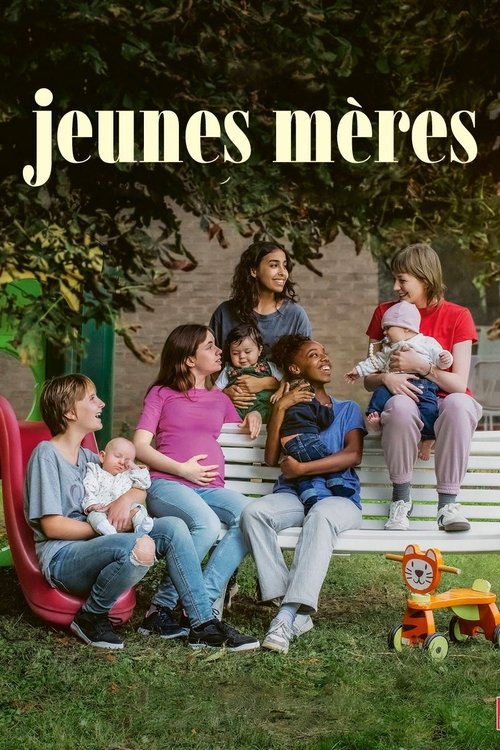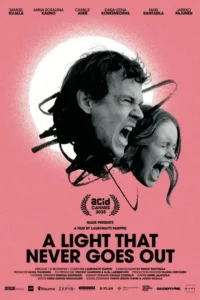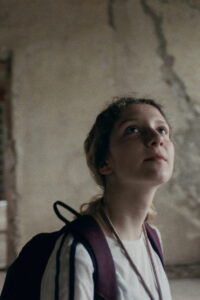Last updated on June 9, 2025
A film by Luc Dardenne , Jean-Pierre Dardenne
With: Lucie Laruelle, Babette Verbeek, Elsa Houben, Janaïna Halloy Fokan, Samia Hilmi, Jef Jacobs, Günter Duret, Christelle Cornil, India Hair, Joely Mbundu
Housed in a shelter for young mothers, Jessica, Perla, Julie, Naïma and Ariane, all of whom have grown up in difficult circumstances, struggle to obtain a better life for themselves and their children.
Our rate: **(*)
From its very first images, the Dardenne brothers Young Mothers seems to follow in the footsteps of their most socially conscious works, and perhaps to remind us of Emilie Dequenne, to whom the two brothers paid tribute just after the official screening at the Grand Théâtre Lumière. The film opens with a handheld camera following in the footsteps of a young woman who opens the doors to a place where a small theater of life plays out every day, between laughter and tears, a maternal home, where staff, patients, and their guests circulate. Rosetta’s factory gives way here to a place where people are valued, where emotional issues are taken seriously, where everyone strives to accompany, support, and help. While the immersion process, modeled in every way on a formula that worked—before becoming tiresome—reminds us of the early works of the Dardenne brothers, deeply focused on social issues and individual portraits, the initial developments suggest that the analogy does not end there. that the social drama that unfolds will seek throughout to make us feel all the difficulties of this young mother, that we will be invited to share her tears as the function of the maternity home becomes clearer. Beyond the simple act of giving birth to babies, social issues arise, but also sociological, psychological and sometimes even psychiatric ones. Behind the happy events lie traumatic pasts, a difficult present, and an uncertain future. The maternity home is reminiscent in many ways of social centers, or even homes for disadvantaged children, where staff try every day to compensate for emotional deficiencies. In this respect, we fear that overly emphatic, overly calculated (or even manipulated) pathos will “crush” the personal storylines that are presented to us, and that we will return to the criticisms we could level at the Dardenne brothers, who, lacking inspiration, were unable to reinvent themselves, or, on the contrary, we might also fear that the overall narrative would become bogged down in the ordinary, as was sometimes the case when they offered us bland stories, especially when they embraced the goal of delving into political issues and tackled a subject they treated with great distance, even though the documentary material could have enriched it. But one element distracts us somewhat and piques our interest, compensating for this impression of “classicism” that settles in us: the renewal of the writing style, which is pluralistic and, for one of the first times, no longer focuses on a central character and their entourage, but seeks instead to deliver a collective portrait, to recount chronicles, even short stories. For once, literature makes a more obvious appearance, beyond the obvious documentary nature of the film. We are offered a work of fiction, selecting and concentrating on certain moments, while maintaining the naturalistic style that the Dardenne brothers’ films have always had, reinforced by the absence of music. The development of each of the stories, the discovery of each of the young mothers, the problems they encounter, or the way they interact with each other or their entourage, sorely lacks the poetry found in similar films—we are thinking in particular of American independent films—and therefore leaves us wanting more, even though the whole thing is not without vitality, and the overall balance is rather skillful, subtly balancing psychological difficulties with projections toward another possibility. However, everything seems to foreshadow a downturn, a drama, adverse events, or a dramatic continuity that we could or even should be moved by. The famous recipe. The effective tearjerker. The tears will come, yes, just like the American journalist from a renowned media outlet who addressed the brothers at a press conference with great difficulty, so overwhelmed was she by emotion, 14 hours later, by what the film had stirred in her, in relation to her own journey as a young mother. But surprisingly, when we were no longer expecting them, and above all, tears very different from those we had anticipated. Tears of hope, a glimmer in the night, a sudden reason for hope, which catches us off guard. This “twist,” this narrative reversal, will probably earn the Dardennes another place on the winners’ list (we’re betting on the screenplay award, which we think they deserve, but we’re not ruling out the ensemble acting award for the cast, each of whom seems very close to their character and totally committed to the project).










Be First to Comment